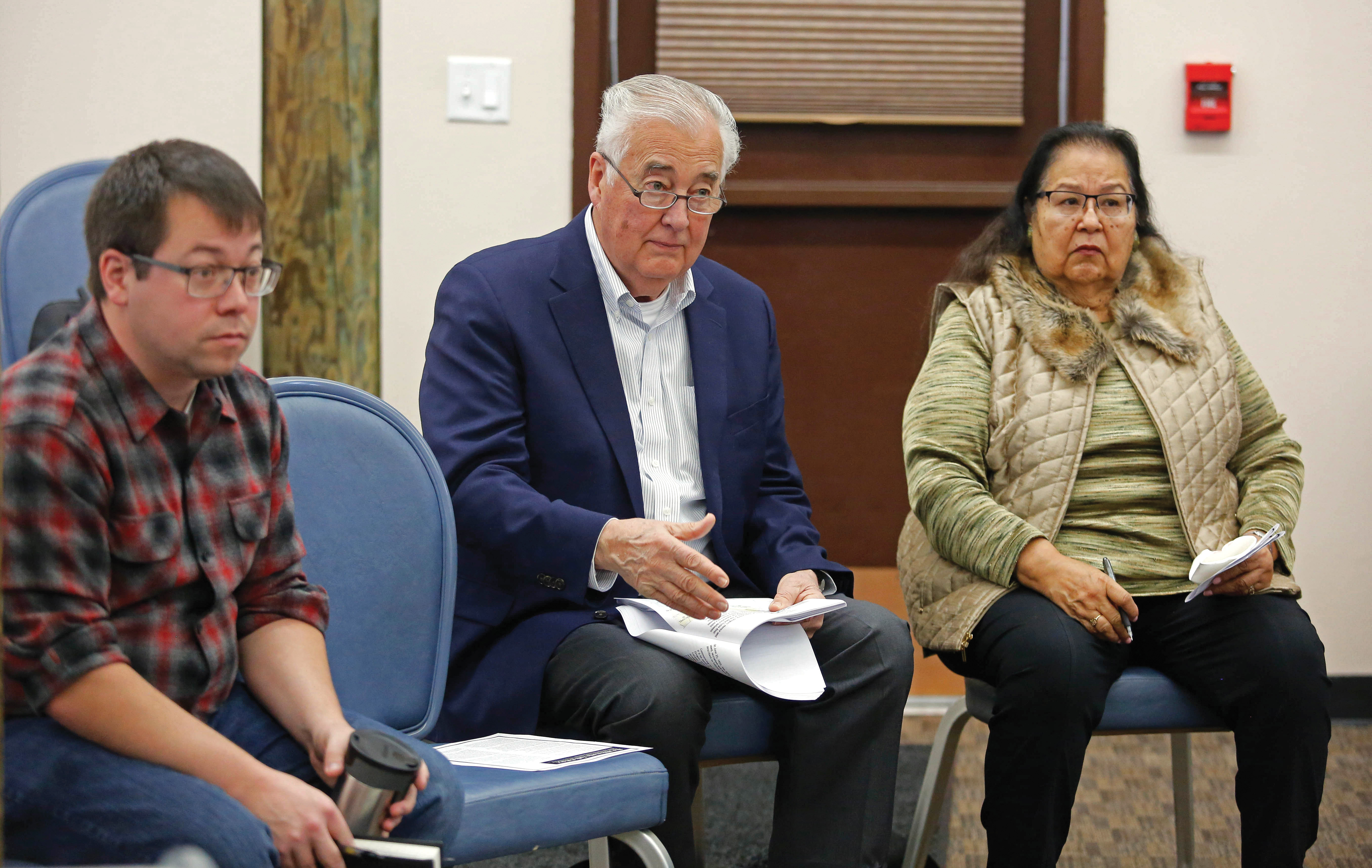Culture
Beckham report bolsters Tribe's historical claims to managing Willamette Falls fishery

Approximately 30 Tribal members got up early on Sunday, Dec. 2, to attend a 9 a.m. “Coffee & Conversation” event held at the Tribal Community Center and hear renowned Oregon historian Dr. Stephen Dow Beckham confirm “unequivocally” that the Willamette Falls fishery belonged to the peoples of the Willamette Valley.
Beckham’s 160-page report was commissioned by the Grand Ronde Tribe to support its claims to Willamette Falls and rebut assertions by Columbia Plateau Tribes that their ancestors also fished at the falls.
Beckham said that as early as 1806 when the Lewis & Clark expedition explored Oregon that 20 Native villages were recorded along the banks of the Willamette River.
“It was the shopping center of the Willamette Valley,” he said.
The area was the aboriginal homeland of the Clackamas, Clowewalla and Multnomah peoples, and was used by the neighboring Kalapuya and Molala.
“The Indian fishery at Willamette Falls is well-documented both before and subsequent to the removal of the Clackamas, Molala and Kalapuya to the Grand Ronde Reservation,” a summary of Beckham’s report states. “There is no documentation in the 19th century of use of the fishery by the Warm Springs, Yakama, Umatilla or Nez Perce Tribes of the Columbia Plateau.”
The report’s findings are important because the Warm Springs, Yakama and Umatilla all protested the Oregon Department of State Lands’ Aug. 31 decision to allow the Grand Ronde Tribe to build a fishing platform at Willamette Falls. The three Tribes claimed the Grand Ronde platform would interfere with their treaty rights to harvest lamprey at the falls.
State Lands Director Vicki Walker reaffirmed that decision on Nov. 26.
Beckham said the Native Americans of the Willamette Valley continued to fish at Willamette Falls even after removal to the Grand Ronde Reservation in the mid-1850s. He cited an 1880s photo taken at the falls that shows a Native American dipnetting.
“Native people had to return to the falls to survive,” Beckham said, citing the poor farmland in the Grand Ronde Valley. “It was a remarkable resource.”
Beckham called Columbia Plateau Tribes’ claims to the Willamette Falls fishery a “modern-day discovery of opportunity.”
“None of the Columbia Plateau Tribes ceded lands west of the Cascade Range,” the report says. “None of the Columbia Plateau Tribes identified ‘usual and accustomed grounds and stations’ for fishing at the falls in the 1942 Swindell report. None of the Columbia Plateau Tribes sought compensation in the U.S. Claims Court or Indian Claims Commission for lands in the Willamette Valley.”
However, Beckham said, an emergency accommodation by the Oregon Department of Fish & Wildlife in the mid-1990s that allowed a spring salmon fishery at Willamette Falls by the four Columbia Inter-Tribal Fish Commission Tribes muddied the waters. The Grand Ronde Tribe, which was only 10 years into Restoration, was not consulted or informed about the agreement when it occurred.
Beckham said he and fellow ethnohistorian E. Richard Hart found no evidence in separate reports commissioned by the state Department of Justice that Willamette Falls was ever a “usual and accustomed grounds and stations” for eastern Oregon and eastern Washington Tribes.
“Restoration for Grand Ronde came at a high price,” Beckham said, referring to the consent decree which required the Tribe to sacrifice hunting and fishing rights in return for state support of the 1988 Reservation Plan. Since then, the Tribe has slowly recaptured ceremonial hunting and fishing rights, as well as completed and fished from the Willamette Falls platform.
Cultural Resources Department Manager David Harrelson said one of the takeaways from Beckham’s report is that Tribal knowledge maintained in families, such as the traditional practice of exacting a tribute from visiting Tribes that fished at Willamette Falls, is buttressed by historical accounts.
Tribal Council Chairwoman Cheryle A. Kennedy thanked Beckham for his research. “We are after the truth,” she said.
Other Tribal Council members who attended included Lisa Leno, Denise Harvey, Kathleen George, Michael Langley, Secretary Jon A. George and Vice Chair Chris Mercier. Tribal staff who attended included Tribal Attorney Rob Greene, Chief of Staff Stacia Hernandez, General Manager David Fullerton and Deputy Press Secretary Sara Thompson.
The full report, which was submitted by the Grand Ronde Tribe to the State Lands Department and Oregon Department of Fish & Wildlife, can be found at www.grandronde.org/about/archives/.
